Computer Science News
Warwick Postgraduate Colloquium in Computer Science 2019
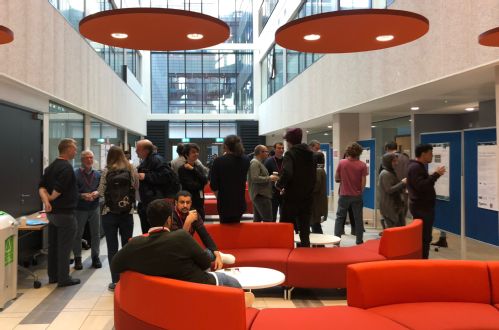
The 17th Warwick Postgraduate Colloquium in Computer Science (WPCCS) was held on Monday 9 December, in the Mathematical Science Building for the first time. This year’s event saw 78 submissions from postgraduate research students in the Department. The submissions were split across six varied tracks, highlighting the breadth and depth of research currently being conducted by PhD students within the Department.
Student presentations were supplemented with two engaging guest talks from academics in the Department. Torsten Mütze captured everyone's attention with the mathematics behind origami, and Feng Hao enlightened the audience on the encryption challenges behind e-voting. The day concluded with a festive drinks reception, sponsored by the Department’s two Centres for Doctoral Training (CDTs), at which prizes were awarded to the best posters and presentations.
PhD student attendee Jonathan Davies said, “It was very rewarding for me to present at WPCCS this year. It gave me the opportunity to share my research with others and engage in stimulating conversation with my fellow postgraduate colleagues. The guest talks, in particular, were thought-provoking and engaging. I look forward to presenting at WPCCS in the future."
Hakan Ferhatosmanoglu, Director of Postgraduate Research and CS CDT, said, “It was a pleasure to attend WPCCS this year and to celebrate the excellent work that has been undertaken by our PhD students in the past year. It was great to see how everyone was having research discussions and exchanging ideas with each other.”
Prize Winners
- Best Presentation - John Pocock
- Best Poster - Tom Wood
- Best in Computational Biology - John Pocock, Rawan Abulsayli and Hammam Alghamdi
- Best in Theory, Foundations, and Discrete Mathematics - Alex Dixon and Thesjaswini Raghavan
- Best in Computer Security and Networks - Jasmine Grosso and Shin Wan
- Best in Machine Learning and Artificial Intelligence - Tom Wood, Abeer Almowallad, Gabriele Pergola, Haoyi Wang, Junyu Li and Helen McKay
- Best in High Performance Computing and Databases - Richard Kirk and Dean Chester
- Best in Urban Science - Jonathan Davies, Teddy Cunningham, Elisa Baioni, Ivana Tosheva and Shanaka Perera
In memoriam: Emeritus Professor Roland Wilson
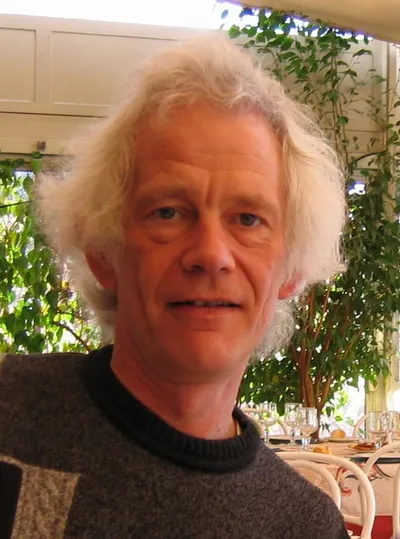 It is with great sadness that we report that Professor Roland Wilson passed away on 19 November 2019. He joined the Department of Computer Science as Senior Lecturer in 1985, becoming Reader in 1992 and Professor in 1999, serving as Head of Department from 2006 to 2009, and retiring to Emeritus Professor in 2010.
It is with great sadness that we report that Professor Roland Wilson passed away on 19 November 2019. He joined the Department of Computer Science as Senior Lecturer in 1985, becoming Reader in 1992 and Professor in 1999, serving as Head of Department from 2006 to 2009, and retiring to Emeritus Professor in 2010.
Professor Wilson was one of the world's foremost experts in image processing leading one of the UK's largest image processing groups, at the University of Warwick. He conducted image processing research at an international level for more than 30 years, publishing over 130 papers, and supervising over 20 PhD students to completion. He was jointly awarded the 1985 Pattern Recognition Society medal for best paper in the journal Pattern Recognition.
Roland was renowned for his deep knowledge and understanding of signal and image processing and information theory and was one of the earliest proponents for the idea of multiscale image analysis, an idea common place in modern artificial neural networks. This led to some break-through works in image representations, including spatial/spatial-frequency representations such as the multi-resolution wavelet transform (MFT) for which he and his many PhD students were able to show to have numerous useful applications from image restoration, object detection, image segmentation and music transcription. Many of his ideas developed from interests in the working of the human visual system and further inspired by his long and fruitful collaboration with colleagues from the University of Linkoping, Sweden, Gösta Grunland and Hans Knutsson. This had begun during a visit to Linkoping in the early 1980s.
At Warwick, Roland taught probability theory, digital signal processing (with colleagues from Engineering) and neural computing for many years. Even up to this day, his neural computing course (which he first taught in the early 1990s, way before the current fashions in machine learning) continues to be hugely popular. On it he showed students not only the mathematics and principles of artificial neural networks, but also how it is understood our brains perform computation for perception and how memory works. Roland had a great passion for this subject and a unique and profound understanding of it, having read widely in neuroscience and neurophysiology. Over the years, he has been an inspirational teacher to many hundreds of Warwick computer science graduates.
In 2006 Roland co-founded a University spin-out tech company (Warwick Warp) to apply his ideas on image analysis to the challenging problem of fingerprint matching. He used his knowledge and ingenuity to solve the problem of fast and accurate fingerprint matching and this led to a set of novel methods. These were later patented and a software implementation was bench-marked in 2010, ranking in the world's top three commercial fingerprint matching solutions. The algorithm he devised are being used to this day for humanitarian work with the UNHCR and in a commercial setting for access-control at numerous construction sites in the UK. In 2010, he decided to take part-retirement and to focus more on commercial research, enjoying the challenge of the need to create practical solutions within the constraints of speed and data storage.
Roland was a wonderfully supportive father and grandfather and will be greatly missed by family, friends and colleagues. Our deep condolences are sent to his children Neil and Katy, and grandchildren, Robin, Sam, Charlie and Isla.
Colleagues and friends are invited to attend a celebration of Roland's life at Cannon Hill Chapel, Canley Crematorium, Friday 13 December at 10:30am.
DCS students participate in European Programming Competition
 On 15–17 November, we saw a number of Department of Computer Science students from across undergraduate and postgraduate communities represent Warwick at the Northwestern Europe Regional Contest (NWERC) held in Eindhoven, the Netherlands. Our 3 teams (led by Dr Dmitry Chistikov) finished in the middle of the 124-team scoreboard.
On 15–17 November, we saw a number of Department of Computer Science students from across undergraduate and postgraduate communities represent Warwick at the Northwestern Europe Regional Contest (NWERC) held in Eindhoven, the Netherlands. Our 3 teams (led by Dr Dmitry Chistikov) finished in the middle of the 124-team scoreboard.
The NWERC is an annual contest in which teams from universities all over the Northwestern part of Europe are given a series of algorithmic problems.
The goal of each team is to solve as many problems as possible within the 5-hour time limit. Potential solutions are submitted and judged by an automated system. The top teams at the end of the contest qualify for the ICPC global World Finals.
We look forward to the next national round (UKIEPC) in autumn 2020 and to the future NWERC in Reykjavik, Iceland. Training sessions will resume in term 2, please do not hesitate to contact Dmitry (D.Chistikov@warwick.ac.uk) for further details if you’re interested in this.

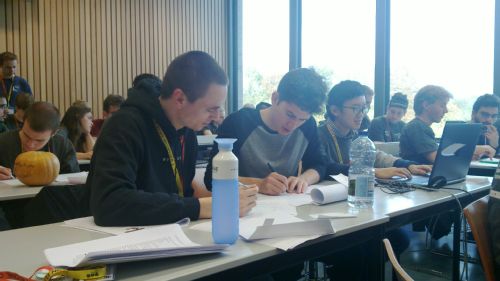
Dr Maria Liakata receives a Turing Artificial Intelligence (AI) Fellowship
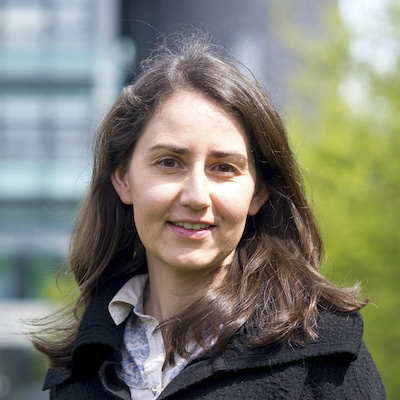
We are please to report that Dr Maria Liakata has received a Turing Artificial Intelligence (AI) Fellowship.
The Fellowships from The Alan Turing Institute, the UK’s national institute for data science and AI, aim to attract and retain exceptional researchers in artificial intelligence. Covering a broad view of AI, including applications of foundational disciplines across mathematical sciences, statistical sciences, computational sciences and engineering, Fellows collaborate across disciplines and have the opportunity to collaborate with academia, industry, government and the third sector.
Dr Liakata’s Fellowship will focus on creating time sensitive sensors from language and heterogeneous user generated content. Commenting on the research she said:
“Wide spread use of digital technology has made it possible to obtain language data (e.g., social media, SMS) as well as heterogeneous data (e.g., mobile phone use, sensors) from users over time. Such data can provide useful behavioural cues both at the level of the individual and the wider population, enabling the creation of longitudinal digital phenotypes.
“Current methods in natural language processing (NLP) are not well suited to time sensitive, sparse and missing data, collected over time or personalised models of language use. The Turing AI fellowship will allow me to establish a new area in NLP on personalised longitudinal language processing.
“I plan to develop sensors for capturing digital biomarkers from language and heterogeneous user generated content to understand the evolution of an individual over time. I want to make a significant contribution to mental health by working with clinical experts to create new tools based on the sensors, making it possible to assess and measure conditions in between clinician appointments.”
To read more on this story, please click here.
Dr Arun Prabhakar joins the department as a Research Fellow
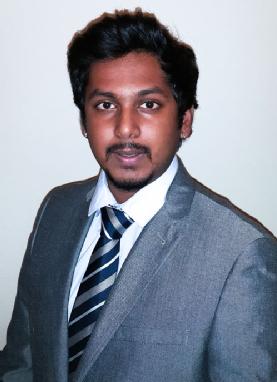
Dr. Arun Prabhakar has joined the department to work as a Research Fellow on ASiMoV (Advanced Simulation and Modelling of Virtual Systems) in partnership with Rolls-Royce and a consortium of partners, including the universities of Cambridge, Edinburgh, Oxford and Bristol. He will be working with Professor Stephen Jarvis and Dr. Gihan Mudalige.
He received his BEng (Hons) and PhD degrees in Mechanical Engineering from the University of Nottingham. He was a recipient of the prestigious Dean's Excellence PhD Scholarship from the University of Nottingham. During the course of his research career he has published several papers and also won awards for his research work.
Before joining the University of Warwick, Dr. Arun worked as Research fellow in the Gas Turbine and Transmissions Research Centre(G2TRC) which hosts the Rolls-Royce University Technology Centre in the University of Nottingham. During his time in G2TRC he has worked with a number of academics in the university and engineers from Rolls Royce in order to help them get an insight of the multi-phase and turbulent flows that arise in an aero-engine using Computational Fluid Dynamics(CFD). Applications of his research at G2TRC included modelling the complicated two phase flow in various sections of the Aero-engine such as the gearbox and bearing chambers and also associated thin film flows.
CS PhD Welcome Event
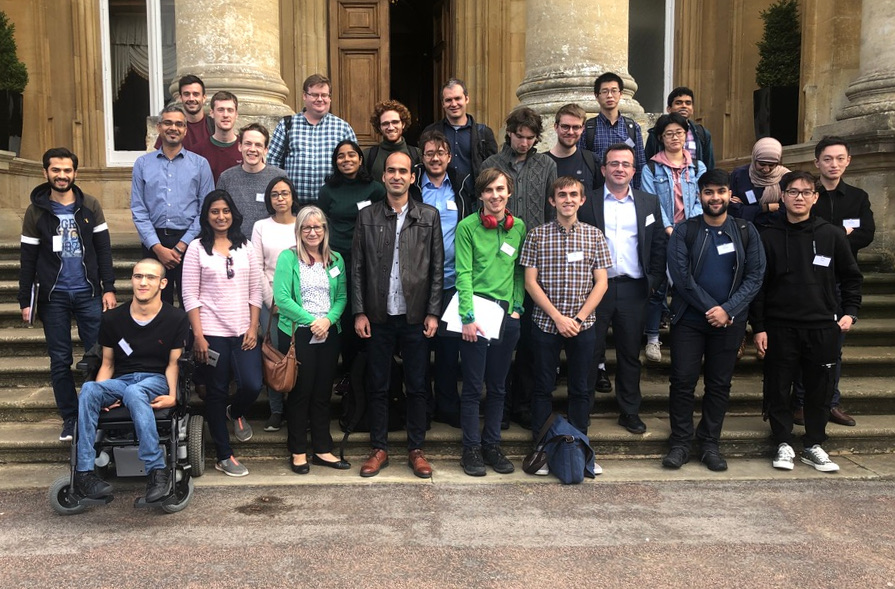
The Department organised an off-campus induction event for the new PhD students in our Centre for Doctoral Training and Research. The agenda included presentations from academics on our large research projects, alongside short tutorials on theoretical computer science and advanced machine learning. There were also informal talks about PhD life, publishing high quality work, and pursuing a research career. The event concluded with a mini data dive using air quality data from London.
The two-day welcome event was held at Heythrop Park in Oxfordshire, which offered the students and academics the opportunity to meet each other in a relaxed environment. The students also met with some of the current PhD students and asked them about their experiences. The programme was very productive with overwhelmingly positive feedback.
We welcome our new cohort of PhD students and look forward to organising similar events across the coming years.
New partnership with Samsung AI Research Centre Cambridge (SAIC)
 We are pleased to announce that the department has established a new partnership with the Samsung AI Research Centre at Cambridge (SAIC). The academic leading this collaboration, Dr Hongkai Wen, from the Artificial Intelligence and Data Science research themes, now works jointly at the University of Warwick and SAIC. The collaboration focuses on the area of efficient machine learning and on-device AI, which enables AI functions to be realised on devices themselves, without necessarily being connected to the cloud, offering more responsive, secure and privacy-preserving user experiences. It hoped that the research activities of this partnership will generate breakthroughs that can be integrated into millions of smartphones, televisions and home appliances.
We are pleased to announce that the department has established a new partnership with the Samsung AI Research Centre at Cambridge (SAIC). The academic leading this collaboration, Dr Hongkai Wen, from the Artificial Intelligence and Data Science research themes, now works jointly at the University of Warwick and SAIC. The collaboration focuses on the area of efficient machine learning and on-device AI, which enables AI functions to be realised on devices themselves, without necessarily being connected to the cloud, offering more responsive, secure and privacy-preserving user experiences. It hoped that the research activities of this partnership will generate breakthroughs that can be integrated into millions of smartphones, televisions and home appliances.
